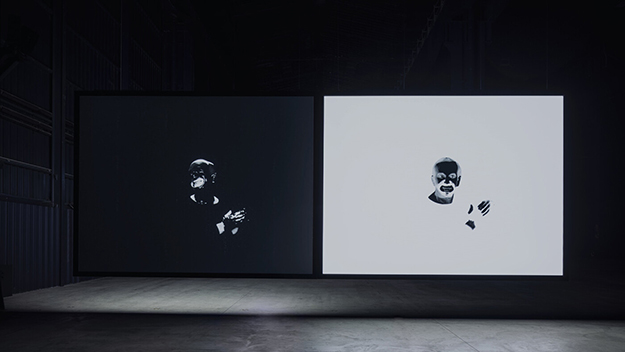Dispatch: IFFR 2023
This article appeared in the February 9, 2023 edition of The Film Comment Letter, our free weekly newsletter featuring original film criticism and writing. Sign up for the Letter here.

Installation view of Sunshine State (Steve McQueen, 2023). Photo: Agostino Osio
“The time of the film is not life while it lives, but life after death.”
These words, spoken by director Peter Schreiner in the opening moments of his intensely moving memoir film Tage (aka Days), have reverberated in my mind ever since I first encountered the movie at this year’s International Film Festival Rotterdam. In this nearly four-hour work, which diaristically captures the homebound travails of the veteran Austrian filmmaker following a cancer diagnosis, the words are meant metaphorically—Schreiner is still alive, and in fact attended the premiere. But elsewhere at IFFR, I found this statement resonating as literally as it did figuratively, across a number of films that spoke to the festival’s long-standing commitment to adventurous international art cinema.
Tage screened in the Harbour program, a new section introduced by festival director Vanja Kaludjercic during her first year at the helm in 2021. That edition, like last year’s, was presented virtually due to COVID-19—making 2023’s the first in-person IFFR in three years, the longest layover of any of the major European festivals. Positioned as a section that “offers a safe haven to the full range of contemporary cinema,” Harbour, which in more precise terms focuses on auteur voices, has effectively taken the place of a number of extraneous sections (Visions; Perspectives; Deep Focus) thankfully eliminated by Kaludjercic in an effort to streamline a festival notorious for its sprawl. While there’s still more to be done in this regard—this year’s program included 455 films, including shorts—it’s clear that change is underway. (Less positive: Kaludjercic’s decision to lay off a majority of the programming staff following last year’s edition, which prompted ire in many quarters, especially as the industry emerged tentatively from the pandemic.)
Like Tage, many of this year’s standout selections forged unique temporal slipstreams. In La Palisiada, the strongest of a somewhat meager Tiger competition, two acts of violence a quarter century apart—the present-day killing of a young male civilian in Ukraine and the state-sanctioned execution of a man accused of murdering a police official in the mid-1990s—frame a nonchronological narrative. Director Philip Sotnychenko, in his first feature, applies an era-appropriate VHS aesthetic to this morally and narratively murky tale of post-Soviet corruption and deep-seated cultural cruelty. Sotnychenko’s screenplay, which is inspired by real events, takes shape obliquely in scenes that often only square in hindsight, quietly revealing connections between the two murdered men and a pair of investigators tasked with analyzing the circumstances surrounding the earlier crime. Grim and austere, La Palisiada is unlikely to prompt the enthusiasm showered on such recent Tiger contenders as James Vaughan’s breezy Friends and Strangers or David Easteal’s quietly virtuoso The Plains, but Sotnychenko’s debut nonetheless announces a director with similar confidence and command.
In the Cinema Regained sidebar, past and present collided in less bleak fashion. Among a number of retrospective titles, a new restoration of Richard Beymer’s 1973 experimental feature The Innerview was one of the more enticing entries. Perhaps best known today for his role as the manager of the Great Northern Hotel in David Lynch’s Twin Peaks, Beymer had a prolific acting career throughout the 1950s and ’60s (including a starring role as Tony in the original film version of West Side Story), before becoming involved in activism and social-justice filmmaking. One of the now 84-year-old Beymer’s few non-documentary projects, The Innerview is a charmingly dated, entirely plotless post-hippie fantasia of hallucinogenic nature imagery, stoned domestic reverie, and bare-chested women—think Stan Brakhage’s Anticipation of the Night (1958), if it had been made for BBS Productions. The experience is indeed the entire point: as an opening title card humorously states, Beymer considers The Innerview to be a work in progress; he continues to add to, subtract from, and rework the film to this day, lending the project a literally timeless aura.
When news of the IFFR layoffs broke, many took it as a sign that the festival was moving away from the kind of artists’ cinema that had long found a home in its short-film and expanded-cinema programs. And while the selection did turn up less such work than usual, the lack was partially mitigated by the presence of Steve McQueen’s Sunshine State, a remarkable two-channel video installation commissioned by the festival and presented at the Museum Boijmans Van Beuningen. The piece pairs footage from the infamous dress-rehearsal scene in 1927’s The Jazz Singer—in which actor Al Jolson dons blackface before taking the stage—with a story McQueen’s father told him on his deathbed of a racist confrontation that he and two other migrant workers from the West Indies had in Florida in the 1950s. McQueen makes striking use of cinema’s first “talkie” by manipulating and reversing images of Jolson applying the makeup so that with every swipe of his hand, the actor’s face disappears, leaving a white void in its place. With each reiteration of the scene, which is juxtaposed in split-screen and projected in different variations on both sides of two screens, McQueen excises portions of the story; before long, all that remains are fiery images of the sun and a powerful refrain: “Sunshine State, shine on me.” Like a mantra, the words resound with primal force, giving voice to a feeling that images can provoke but which stories can reframe. As a simultaneous act of reckoning and remembrance, Sunshine State embodied the best of this year’s IFFR, breathing life into multiple moments in time and across a vast spectrum of personal and political histories.
Jordan Cronk is a film critic and founder of the Acropolis Cinema screening series in Los Angeles. His writing has appeared in Artforum, Cinema Scope, frieze, The Los Angeles Review of Books, Sight and Sound, and more. He is a member of the Los Angeles Film Critics Association.







